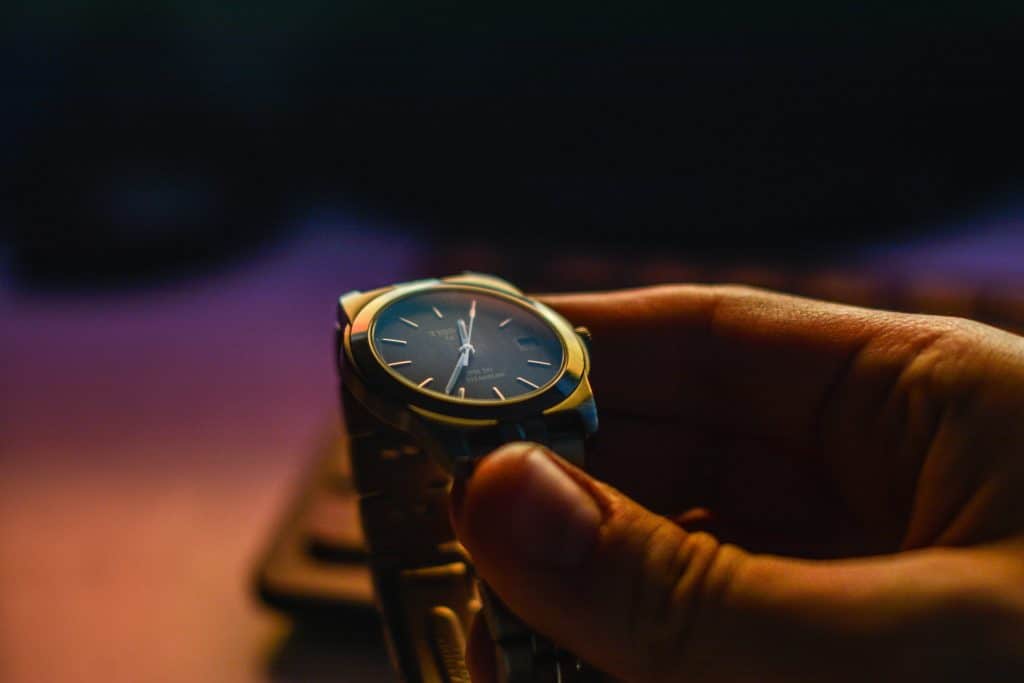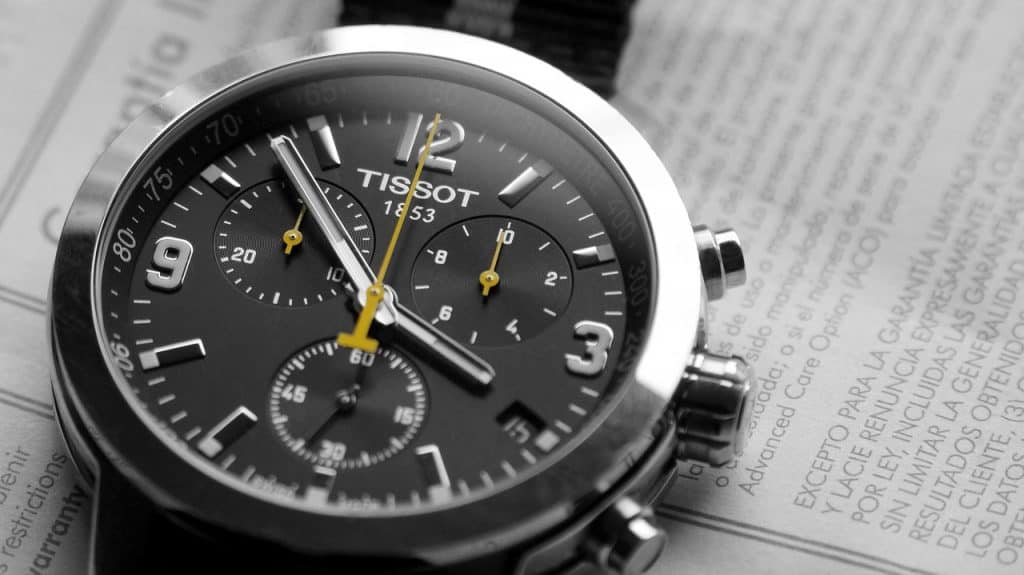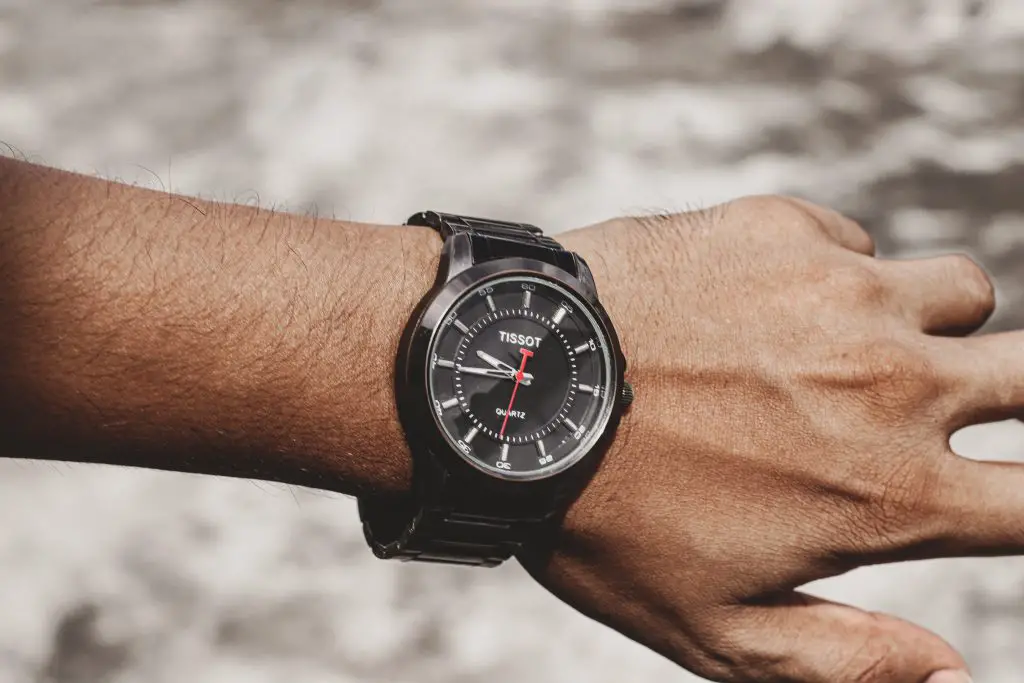Tissot is often regarded as the brand that offers entry-level Swiss luxury watches. But is Tissot actually a luxury watch brand?
Tissot is not officially a luxury watch brand. Tissot is owned by the Swatch Group, which classifies Tissot watches as being ‘middle range’ watches. Furthermore, Tissot watches are produced in large quantities and not made by hand. Aside from that, the brand does use exotic materials and an in-house movement.
Despite not being officially classed as a luxury watch brand, Tissot is frequently seen as one. In fact, whether or not Tissot is a luxury watch brand is one of the more debated topics. This article will go over all the features that would and would not qualify Tissot as a luxury watch brand.

Table of Contents
Is Tissot A Luxury Watch Brand?
Whether or not Tissot is a luxury watch brand is a debated topic. Some would say that Tissot is a luxury watch brand, although at an entry-level, while others claim that it straight up isn’t. And to be honest, both sides have a point.
In order to pinpoint why both sides make these claims, it’s important to look at some key features that are required in a luxury watch. Those are the manufacturing process, the movement, and the materials used. On top of that, a luxury watch needs to carry a feeling of prestige. This feeling often comes from the name of the brand and the price of the watch.
Namesake
If you ask any random person, they would say that Tissot is a good watch brand with luxurious offerings. And that’s definitely true. Tissot is known for offering the best value for your money when it comes to Swiss watches.
Everything about the name seems to be pointing Tissot in the luxury direction. They can even stamp the sought-after ‘Swiss-made’ title on their watches. And that title is regulated, so not any other brand can do that.
However, when we look at the brand and the company itself, we can see that Tissot is owned by the Swatch Group, a conglomerate that owns a multitude of watch brands.
Among the Swatch Group portfolio are the likes of Longines, Omega, Blancpain, Rado, and Hamilton. And the Swatch Group kind of categorizes all their watch brands into a certain ‘level’ or ‘ range’.
Tissot is categorized in the middle range. On the other hand, a brand like Longines is categorized in the high range. And the luxury range is reserved for the likes of Omega and Glashütte Original.
So based on the Swatch Group’s categorization, Tissot is, in fact, not a luxury brand.

Manufacturing Process
An important quality of luxury watches is that they’re made by hand. And judging by the fact that over 3,5 million Tissot watches are produced per year, it’s safe to say that a Tissot watch is not hand-made.
Aside from not being hand-made, such a large production every year also waters down the exclusivity of the watch. And exclusivity is another important factor in whether a watch is a luxury watch or not.
On top of that, Tissot does outsource as much as it can in order to keep the costs down. We talked about how Tissot watches are officially ‘Swiss-made’, but they do push the boundaries here.
In order for a watch to be Swiss-made, at least 60% of the manufacturing process and the components need to originate from Switzerland. There is a small loophole here (which we talk about more in this article) that allows Tissot to outsource slightly more.
Aside from the outsourcing, Tissot assembles and inspects their watches in Switzerland, which is definitely a pro. Although they push the boundaries, Tissot definitely offers a Swiss timepiece.
Movement
Arguably one of the most important parts of a luxury watch is the movement. A watch simply cannot be a luxury watch if the movement is not made in-house. It’s actually one of the main reasons why a brand like TAG Heuer isn’t officially a luxury watch brand.
Tissot does, in fact, make their own movements, but it’s a little more complicated than that.
As part of the Swatch Group, it isn’t uncommon for all the brands to share some of the processes. And aside from owning all the different watch brands, the Swatch Group also owns ETA, the largest movement-making company.
Many of Tissot’s movements are based on ETA models, which could lead to some saying that Tissot doesn’t actually make its own movement.
But even if that’s true, ETA and Tissot are essentially owned by the same company, which would still make these movements count as made in-house.
Materials
When you purchase an expensive watch, you’d expect the materials to be of high quality. In fact, you’re not even wrong for expecting these watches to contain some sort of exotic material such as gold or diamonds.
In the case of Tissot, they use great quality materials all throughout. They use the industry-leading 316L stainless steel, a very dense form of stainless steel that’s difficult to scratch and break.
The dial is also always made out of sapphire crystal, which is once again the industry-leading material for the dial. Sapphire crystals are incredibly difficult to scratch. Only diamonds can leave scratch marks on a sapphire crystal.
In terms of materials used, Tissot definitely holds up the luxury end. Keep in mind, these materials are the same materials used in many high-end luxury watches. The only difference is that Tissot offers them for a much more affordable price.

Price
Luxury watches are typically tied to a really high price. Just look at the average Rolex or Patek Philippe; those prices range into the multiple thousands, and sometimes even tens of thousands per watch.
Looking at Tissot, the average price of a watch is only $750. Now, $750 is still a large sum of money, but it’s not even close to the prices of other Swiss luxury watches.
A high price isn’t the only requirement for a watch to be a luxury watch, but a high price sets a high barrier to entry. After all, a luxury watch is supposed to be just that, something luxurious and something that not everyone is able to get their hands on.
With a low price and a low barrier to entry, Tissot watches are much more readily available than other luxury brands. This, in turn, takes away from the exclusivity of the brand and the watch, taking away some of that luxury feel.
Are Tissot Watches Valuable?
Tissot watches are valuable both in terms of quality and price. Although not as expensive as other luxury watch brands, Tissot watches are still priced relatively high for the average person. As for quality, Tissot is known to offer the best value for your money.
Tissot watches are, without a doubt, valuable. They’re of high quality, and they’re not exactly cheap either. But on the other hand, they’re not all that great at retaining their original value either.
And that has everything to do with the fact that Tissot watches aren’t too exclusive. Every year, another 3,5 million Tissot watches are made, and a product that’s mass-produced like that isn’t exclusive or rare. And products that aren’t rare or exclusive typically don’t appreciate in value.
In fact, the opposite is true, as a Tissot watch typically depreciates 10-20% every year for the first three years.
If you want to read more about why Tissot watches aren’t too good at retaining their value and why they aren’t a great investment if you’re looking to make money, you should read this article, which goes more in-depth on the topic.
Of course, if you just want to buy a stunning timepiece for a fantastic price, Tissot is one of the best options out there!
